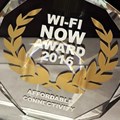
Subscribe & Follow
#AfricaMonth
In the news
#InnovationMonth: Municipalities can make sustainable free Wi-Fi a reality
Quality free Wi-Fi at sizeable daily allowances (500MB) and good bandwidth speeds (over 5 Mbps) enables the less privileged to equally sit at the same internet table as the most privileged.

South Africa has a flagship free Wi-Fi project in the Tshwane network. Every month, 600,000 regular users enjoy a network that has won global awards.
Yet, why has this project - that is more than three years old - not been replicated elsewhere in the municipalities of South Africa all crying for the same need to be addressed?
What municipalities fear
It's due to the question of sustainability. Once you switch on free Wi-Fi, you cannot switch it off. Municipalities are fearful that free Wi-Fi will become an ongoing, ever-growing additional line item in their already overstretched budgets.
The critical importance of connecting citizens both now and in the long run has not sunk in yet. It is like having a low-income community that needs a road. They then decide not to build a road because they don’t want the ongoing burden of maintaining it - ignoring all the economic benefits of a road and what it will do to uplift that community.
But free Wi-Fi is sustainable. Left to market-related forces, it has been rolled out in the high-end shopping malls. Its waves wash over the wealthy as they sip their coffee. It is given as a benefit to those who need it least and who often would prefer to use the privilege of their mobile data contracts.
If free Wi-Fi is going to reach those who need it most, who will benefit the most, then municipalities need to step in. They need to direct its waves to their low-income citizens. The ongoing operational costs of free Wi-Fi, unlike a road, can be covered.

Why municipalities need to step in
Municipalities have assets that are very important in leveraging free Wi-Fi projects and making them sustainable. They include:
- Venues
- Provision of power
- High sites (water reservoirs)
- Way leave permission
By using these assets, they can sustain free Wi-Fi projects.
1. Through Wi-Fi advertising
Wi-Fi advertising is the revenue model for free Wi-Fi used around the world at airports and stadiums. Adverts are inserted into the browser experience every five minutes. Videos are watched and even questions are required to be answered in order to get more data.
2. From mobile network operators
The rent that they gain from mobile network operators can be used to fund free Wi-Fi. Interestingly, the mobile network operators are very open to providing free localised Wi-Fi data stations every two to three kilometres. As mobile network data speed requirements increase, their need for municipal venues and lamp posts will increase. These need to be traded for free Wi-Fi.
3. From fibre operators
Fibre companies need way leaves to roll out their routes often to the wealthier areas in order to gain maximum return on the investment. Municipalities can insist that granting of these way leaves is combined with free Wi-Fi hot spots and that a proportion of fibre is rolled out in low-income areas.
4. Through community portals
Local news networks have a printer and a van that can deliver news content from the municipality to their citizens. The printer and van are free Wi-Fi, the paper is the smartphone.
5. By micro jobbing subscriptions
There is a growing economy for micro jobbing - small tasks that companies need to have done for which they are willing to pay. Those jobs can be done by a database of people developed by giving them free Wi-Fi. They are willing to pay a small monthly subscription to be on that database and receive micro jobs.
6. Through entertainment subscriptions
Netflix and Showmax are aggressively growing and are willing to supplement free Wi-Fi data costs to gain more customers.
7. From search engine
Google has become one of the biggest companies in the world through a search engine. Google's competitors are willing to share that revenue with the free Wi-Fi network provider.
8. By additional data rewards
Additional data can be given on a reward basis that helps improve the running of a municipality:
- For being up to date with municipal bills
- For collecting litter
- For completing a survey
9. By enhancing debt collection
Activity on a free Wi-Fi network can show that a user is out and about and generally more willing to take a telephone call. Municipalities can use this information to chase debts more effectively.
10. Through digital and pole advertising
LinkNYC has been funded by this revenue source alone. Digital advertising boards need to be linked to a network to be updated and that same network can supply free Wi-Fi. Printed boards can also be used to actively show who has sponsored the free Wi-Fi.
11. By charging for additional data
Once the daily allocation has run out, voucher systems can be used to allow the user to pay for more data.
The good news is that there are many ways in which sustainable revenue can be gained from free Wi-Fi. By combining these, the ongoing costs can be covered. The bad news is that there is no one silver bullet that will cover all the costs.
Municipalities have a key role to play in the roll out of free Wi-Fi:
- By making available the assets they have at their disposal, venues, lamp posts, power, high sites, municipal fibre
- By trading these assets with service providers for free Wi-Fi to their least privileged citizens
- By aggregating the different revenue contributors to create sustainable free Wi-Fi.
- By ensuring through service level agreements that all citizens get free Wi-Fi within walking distance and that the Wi-Fi is great quality.
For more, download the complete Sustainable Municipal Free Wi-Fi report.












